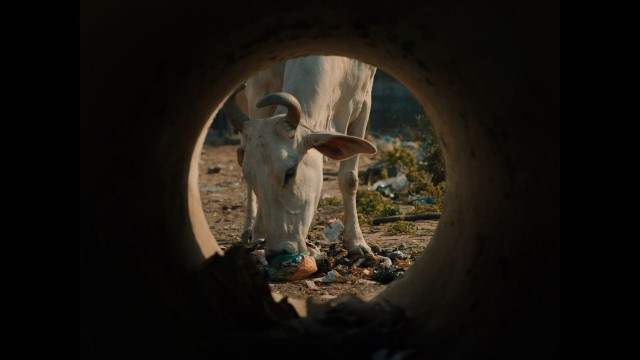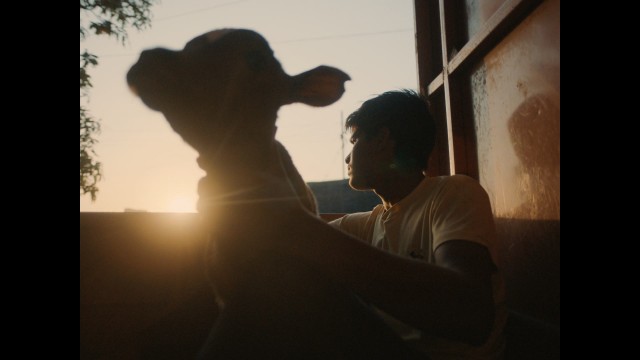In a monumental work of short filmmaking, returning artist Varun Chopra (Lyrically Bleating Horns) has found the fulcrum upon which his country’s future rests and determines that it is based on a “potent irony”. A story of politics at the micro-level, Holy Cowboys is a dispatch from rural India at a momentous time for the country as the world’s largest democracy threatens to slide into an authoritarian-lead religious nationalism. The defense of cows, seen as holy by the majority Hindu population, has been perverted by a “politicization of compassion” and has become right-wing extremism’s most potent recruiting tool in turning the country’s Hindus against its Muslim minority. Rather than describe these issues in a journalistic style, Chopra and his team embed with a group of youths seduced to vigilantism by a charismatic leader, blending fly-on-the-wall documentation with lightly scripted sequences to tell a dark coming-of-age story of an individual’s radicalization.
For many, that last line is enough to raise alarm bells. While the remarkable growth of the form in the past decade and a half has been called a “golden age” for documentary and created a growing maturity around its artistic potential, even within the documentary and critical community many still feel uneasy about deviations from a strictly “factual” approach, whether they be reasons artistic or commercial. I’d like to put forward Chopra’s “hybrid” approach in Holy Cowboys as a rebuttal though, as the liberties in its formal style arguably present a deeper “artistic truth” than a reportorial approach could. The transnational movement towards extreme right-wing politics seen in the rise of white nationalism in the USA, the revival of Nazi and Fascist factions in Europe, and the Hindu Nationalist government in India amongst others is one of the most reported stories of the past several years. There is no lack of coverage of these trends and yet an understanding of the motives, psychology, and appeal of these extreme elements often feels beyond the grasp of mainstream news consumers. Chopra freely employs the tools that have caused cinema to be called “a machine that generates empathy” to place you in the shoes of Gopal, a poor youth working in a Gujrati factory, and allows you to experience first-hand the seductive blend of purpose, power, and self-righteousness that recruitment to an extremist faction provides.

Inventive cinematographic choices support a level of narrative construction that is rare in documentaries
At 24min the film is not a pulse-pounding thriller, but in its effect, it feels more like a narrative film than a documentary as the film’s story arc is finely tuned and the emotional tenor is modulated through bold directorial choices and dreamy cinematographic sequences. Some of this must be credited to its editor, Carol Nguyen, herself an S/W alum with No Crying at the Dinner Table, but some of this is the careful and meticulous storytelling partially afforded by the hybrid approach. Symbols abound and ironies stack up—one memorable and heart-rending sequence sees a cow’s stomach excavated, pulling forth mountains of plastic bags—Gopal works in a factory that makes plastic bags. Another sees Gopal, after being brought to the headquarters of a vigilante cow defense group to receive praise for saving a calf, listening to a stirring monologue from the group’s leader basically bragging about lynching a man. The camera pulls away to zoom onto a mask hanging outside—these masks are folkloric traditions meant to ward off evil.
While the specific decisions around this “hybrid” approach are impossible to tease apart, as a whole Holy Cowboys presents an urgent picture of a growing evil in a way that represents the best of both documentary and narrative storytelling traditions. Ignoring the power of its subject matter it is also simply one of the most beautiful and innovatively constructed short films of the year and it is a pleasure to share it with you. Premiering officially online today after a robust festival run that saw it play Palm Springs, Rotterdam, and Clermont-Ferrand, I would expect us to be talking about the film well into 2024 as the film’s Grand Jury win at DocNYC qualifies it for Oscar contention. As for new projects, Chopra shares that he is working on a feature that delves into many of the themes presented in this short.

 Jason Sondhi
Jason Sondhi
